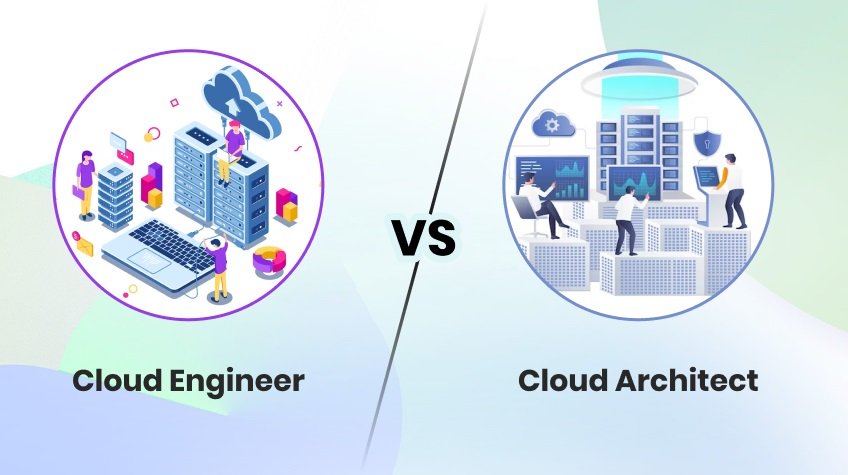Cloud Security Engineer vs Cloud Architect: Key Differences and Career Paths

Introduction
In today’s digital age, cloud computing has become the backbone of many enterprises, offering scalability, flexibility, and cost-efficiency. As organizations continue to migrate their operations to the cloud, the need for skilled professionals to manage, secure, and design cloud environments is at an all-time high. Two of the most critical roles in this domain are the Cloud Security Engineer and the Cloud Architect. While these roles may seem similar, they have distinct responsibilities, skill sets, and career trajectories. This article will delve into the key differences between these two roles and guide you in choosing the right career path.
What is a Cloud Security Engineer?
A Cloud Security Engineer is a professional responsible for ensuring that an organization’s cloud environments are secure and compliant with relevant regulations. They design, implement, and manage security measures to protect data, applications, and infrastructure from cyber threats.
Key Responsibilities:
- Implementing security measures such as firewalls, encryption, and identity management
- Monitoring and responding to security incidents
- Conducting risk assessments and vulnerability testing
- Ensuring compliance with industry standards and regulations
- Collaborating with other IT teams to integrate security into all cloud-related processes
Required Skills and Certifications:
- Strong understanding of cloud platforms (AWS, Azure, Google Cloud)
- Knowledge of cybersecurity principles and best practices
- Familiarity with security tools like SIEM (Security Information and Event Management) systems
- Relevant certifications such as CISSP (Certified Information Systems Security Professional) or AWS Certified Security
Role in Ensuring Cloud Security: Cloud Security Engineers play a crucial role in protecting an organization’s data and systems. They are the first line of defense against cyberattacks and must stay updated on the latest security threats and technologies.
What is a Cloud Architect?
A Cloud Architect is responsible for designing and overseeing the implementation of cloud environments that meet the technical and business requirements of an organization. They ensure that the cloud infrastructure is scalable, efficient, and aligned with the company’s goals.
Key Responsibilities:
- Designing cloud architecture that meets the organization’s needs
- Selecting appropriate cloud services and technologies
- Ensuring the infrastructure is scalable, reliable, and cost-effective
- Working with stakeholders to understand business requirements
- Overseeing the implementation and deployment of cloud solutions
Required Skills and Certifications:
- In-depth knowledge of cloud platforms and services
- Experience with infrastructure as code (IaC) tools like Terraform or CloudFormation
- Strong problem-solving and analytical skills
- Relevant certifications such as AWS Certified Solutions Architect or Google Professional Cloud Architect
Role in Designing Cloud Infrastructure: Cloud Architects are the visionaries behind an organization’s cloud strategy. They design systems that support business objectives and ensure that the infrastructure can scale as the company grows.
Key Differences Between Cloud Security Engineers and Cloud Architects
Focus and Objectives:
- Cloud Security Engineer: Focuses on securing the cloud environment against threats and ensuring compliance.
- Cloud Architect: Focuses on designing a scalable, reliable, and efficient cloud infrastructure.
Technical Expertise:
- Cloud Security Engineer: Requires deep knowledge of security principles, threat management, and compliance.
- Cloud Architect: Requires expertise in cloud architecture, service models, and infrastructure design.
Collaboration and Teamwork:
- Cloud Security Engineer: Works closely with security teams, developers, and IT operations to implement security measures.
- Cloud Architect: Collaborates with business stakeholders, developers, and IT teams to design and implement cloud solutions.
Tools and Technologies Used:
- Cloud Security Engineer: Uses security tools like firewalls, SIEM systems, encryption tools, and identity management systems.
- Cloud Architect: Utilizes infrastructure as code (IaC) tools, cloud management platforms, and various cloud service models.
Educational Pathways
For Cloud Security Engineers:
- Recommended Degrees: A bachelor’s degree in cybersecurity, information technology, or computer science.
- Courses to Consider: Cybersecurity fundamentals, cloud security, network security, and ethical hacking.
For Cloud Architects:
- Recommended Degrees: A bachelor’s degree in computer science, information technology, or a related field.
- Courses to Consider: Cloud computing, system architecture, infrastructure as code, and cloud service models.
Career Paths and Opportunities
Cloud Security Engineer:
- Career Trajectory: Entry-level roles typically start as a security analyst or engineer, progressing to senior security engineer, security architect, and eventually, chief information security officer (CISO).
- Salary Expectations: Cloud Security Engineers can expect to earn between $90,000 and $150,000 annually, depending on experience and location.
- Job Market Trends: The demand for Cloud Security Engineers is growing rapidly as organizations prioritize cloud security.
Cloud Architect:
- Career Trajectory: Entry-level roles start as a cloud engineer or solutions architect, moving up to senior cloud architect, and eventually, a chief cloud officer (CCO) or chief technology officer (CTO).
- Salary Expectations: Cloud Architects can earn between $120,000 and $180,000 annually, with higher earnings in senior positions.
- Job Market Trends: The need for Cloud Architects is strong, especially in industries undergoing digital transformation.
Common Challenges Faced by Cloud Security Engineers
Dealing with Security Breaches: Cloud Security Engineers must be prepared to respond quickly and effectively to security incidents to minimize damage and prevent future attacks.
Keeping Up with Evolving Threats: The cybersecurity landscape is constantly changing, requiring engineers to stay informed about the latest threats and defensive technologies.
Compliance and Regulatory Challenges: Ensuring that cloud environments meet industry standards and regulations can be complex and time-consuming.
Common Challenges Faced by Cloud Architects
Designing Scalable and Reliable Infrastructure: Cloud Architects must design systems that can scale with business needs while maintaining reliability and performance.
Managing Cloud Costs: Keeping cloud expenses under control while delivering high-quality services is a significant challenge.
Balancing Performance and Security: Architects must find the right balance between system performance and security, often requiring trade-offs.
Certifications for Cloud Security Engineers
- CISSP (Certified Information Systems Security Professional): Recognized globally as a top cybersecurity certification.
- AWS Certified Security – Specialty: Validates expertise in securing AWS environments.
- CompTIA Cloud+: Covers cloud security concepts, administration, and troubleshooting.
Certifications for Cloud Architects
- AWS Certified Solutions Architect – Professional: Demonstrates advanced knowledge of AWS architecture.
- Google Professional Cloud Architect: Validates expertise in designing and managing cloud solutions on Google Cloud.
- Microsoft Certified: Azure Solutions Architect Expert: Focuses on designing and implementing solutions on Microsoft Azure.
Tools and Technologies Used by Cloud Security Engineers
Security Tools and Platforms: Engineers rely on tools like SIEM systems, firewalls, encryption software, and identity management platforms to secure cloud environments.
Automation and Continuous Monitoring: Automation tools like Ansible and continuous monitoring solutions are essential for maintaining security in dynamic cloud environments.
Tools and Technologies Used by Cloud Architects
Infrastructure as Code (IaC) Tools: Terraform and CloudFormation allows architects to manage infrastructure through code, enabling scalability and consistency.
Cloud Service Models: Architects must understand various cloud service models (IaaS, PaaS, SaaS) to design appropriate solutions.
Industry Demand and Future Trends
Growing Demand for Cloud Security Professionals: As cyber threats increase, the demand for Cloud Security Engineers will continue to rise.
Emerging Trends in Cloud Architecture: The future of cloud architecture includes multi-cloud strategies, serverless computing, and edge computing.
Making the Right Career Choice
Deciding Between the Two Roles: Your choice between becoming a Cloud Security Engineer or a Cloud Architect should be based on your interests in security versus design and your long-term career goals.
Factors to Consider:
- Passion for Security: Choose Cloud Security Engineering if you’re passionate about protecting data and systems from threats.
- Interest in Design: Opt for Cloud Architecture if you enjoy designing systems and infrastructure that support business needs.
Conclusion
Both Cloud Security Engineers and Cloud Architects play vital roles in today’s cloud-driven world. While Cloud Security Engineers focus on protecting cloud environments, Cloud Architects concentrate on designing scalable and efficient cloud systems. Understanding the differences between these roles will help you make an informed decision about your career path in the cloud computing field.
FAQs
What is the average salary of a Cloud Security Engineer?
The average salary for a Cloud Security Engineer ranges between $90,000 and $150,000 annually, depending on experience, certifications, and location.
Can a Cloud Architect transition to a Cloud Security Engineer role?
Yes, with additional training and certifications in cybersecurity, a Cloud Architect can transition to a Cloud Security Engineer role.
What industries are hiring the most Cloud Security Engineers?
Industries such as finance, healthcare, technology, and government are among the top sectors hiring Cloud Security Engineers due to their need for robust cloud security.
How long does it take to become a Cloud Architect?
Becoming a Cloud Architect typically requires several years of experience in cloud computing and relevant certifications. On average, it takes about 5-7 years of experience in IT and cloud roles.
Do Cloud Security Engineers need programming skills?
While not mandatory, programming skills can be beneficial for Cloud Security Engineers, especially for automating security processes and integrating security tools into cloud environments.
Also, Read About, Public Cloud vs Private Cloud vs Hybrid Cloud.





